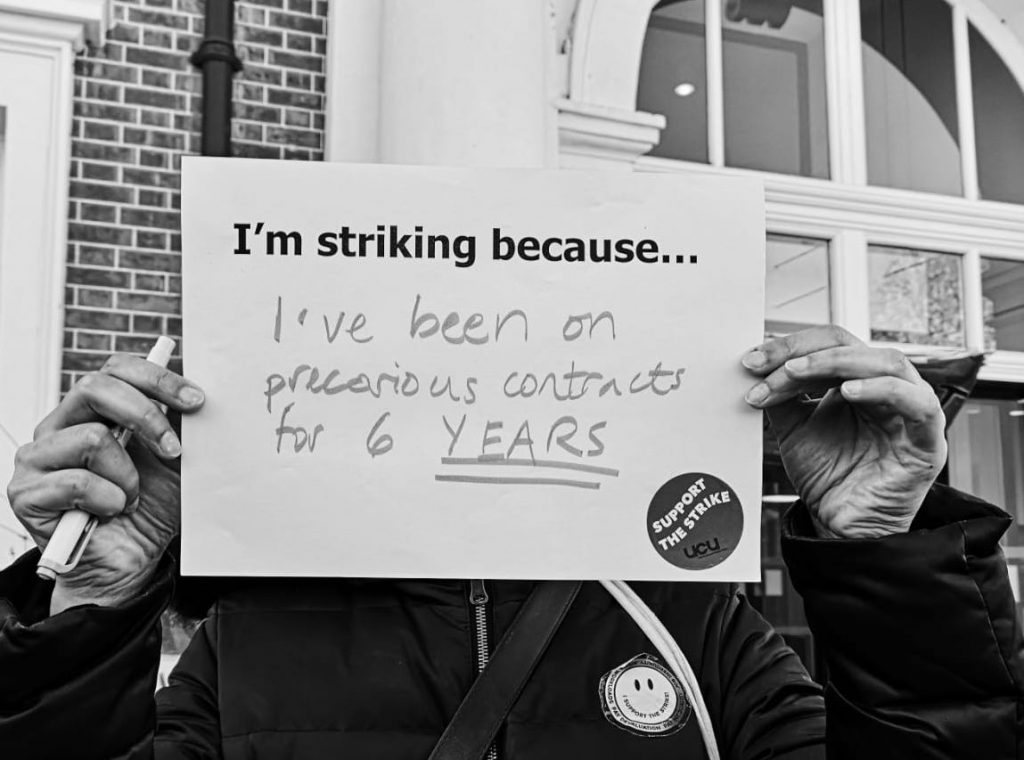We have permission to reproduce testimony of a Goldsmiths casualised worker
“I am writing this letter as a recent PhD and current member of Goldsmiths casualised teaching staff since 2015. I am writing at breaking point for myself and colleagues. A point reached through desperation at the continual assault on casualised teaching staff and our sense of worth, and most recently the betrayal we feel at being declared and treated as “inappropriate” by the university. The roles done by ALs, GTTs and other casualised staff are varied, including those starting out teaching their first class to those who are longstanding and pivotal members of departments. Every single week, COVID-19 or not, most colleagues go above and beyond their contracted hours to provide for students, in doing so we are propping up the institution that fails us at every hurdle. This is an assault on a large group of extremely dedicated teachers and through this it is having a major impact on our mental health.
I find myself drinking far more than usual, less productive than ever and thus unable to produce the research I have been self-funding through teaching. This research necessary to one day find a more stable, perhaps even the dream of an over-worked full-time teaching position. But this is increasingly impossible with the removal of teaching opportunities for those at the beginning of their careers. This is a negative feedback loop, of which recent news about Goldsmiths refusing to support us in this moment of greatest need, while we still teach, mark, study, and it is heartbreaking. Rather than approaching all fixed hours staff to clearly reassure those asked to work extra hours beyond contracts in immediate response to the epidemic outlining a straightforward way to claim pay for extra hours taught the University has chosen to once again act with the opacity with which it has long been known. Nothing is certain and responsibility is abdicated to academic staff and dept. management to deal with whilst simultaneously tying their hands and reducing their own power to act.
Of course we want precarised, casualised working conditions to end but not in this way where those whose labour, care, love for what they do and dedication to their students above and beyond what the university deigns to pay them are discarded as superfluous. All at a time when uncertainty is rife in society and when we were asked to act to support our isolated and young students. All in a week where I responded to a student themself going through a major life incident. This is what we do, we care beyond what we will ever see back. The institution has not only shown it has stopped caring but revealed once again how little care it has for its employees or students, as that is what many of us still are: students asked to pay fees. The feeling of betrayal is physical.
Like many I chose to study at Goldsmiths, to begin my teaching career here and base my life and sense of self around this institution and what in my mind it stands for: social justice, politically engaged resistance to structural and physical violences. I did this with pride. What we are seeing now is an institution that betrays these ethics repeatedly by disregarding their least secure teaching staff and casting a generation of future academics adrift (many of whom are students themselves trying to live in this isolated present). Rather than dealing with this crisis through solidarity, community, and care, Goldsmiths has chosen isolation and exclusion.”
[PIC – GEORGIE HODGES]
